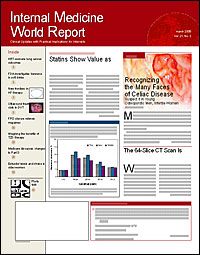Publication
Article
Internal Medicine World Report
ADA Revisits the Clinical Implications of PROactive
TZD Recommended in Patients Already Using Other Glucose-Lowering Agents
When results of the Prospec?tive Pioglitazone Clinical Trial in Macrovascular Events (PROactive) were first published, they seemed to provide many needed answers for the treatment of diabetes. But in a recent statement issued by the American Diabetes Association (ADA) (Diabetes Care. 2005;28:2965-2967), a reexamination of this 2004 study raised some specific questions about the clinical use of this agent.
PROactive included >5000 adults, aged 35 to 75 years who were ?randomized to receive the thiazolidinedione (TZD) pioglitazone (Actos), titrated to its maximum dose of 45 mg/day, or placebo. All patients had a history of cardiovascular disease (CVD) and type 2 diabetes that were being treated with diet and/or glucose-lowering drugs. After about 3 years, use of pioglitazone reduced the combined risk of all-cause mortality, nonfatal myocardial infarction, and stroke by an additional 16% when added to standard therapies.
Based on these results, Robert Rizza, MD, of the Mayo Clinic, Rochester, Minn, and colleagues write that there was a "clear clinical benefit" for adding pioglitazone to the therapy of diabetic patients who were already receiving the conventional diabetes therapy. However, they add, it would take about 50 patients treated with the drug for 3 years to prevent 1 such cardiovascular event.
Thus, Dr Rizza and colleagues reason on behalf of the ADA that since treatment for hyperlipidemia and hypertension has been conclusively proven to lower risk for CVD, "emphasis should first be directed at the ?aggressive use of other conventional cardiovascular risk reduction therapy," before using pioglitazone.
While lauding the design and ?execution of the trial, they write that, compared with the placebo group, the pioglitazone group was at greater risk of heart failure, gained about 3.2 kg more body weight, and had more hypoglycemic episodes. Further?more, 98% of the study participants were white, and although >95% were taking other diabetes medications, none had optimal glycemic control?either when the study began or when it ended.?L.B.





